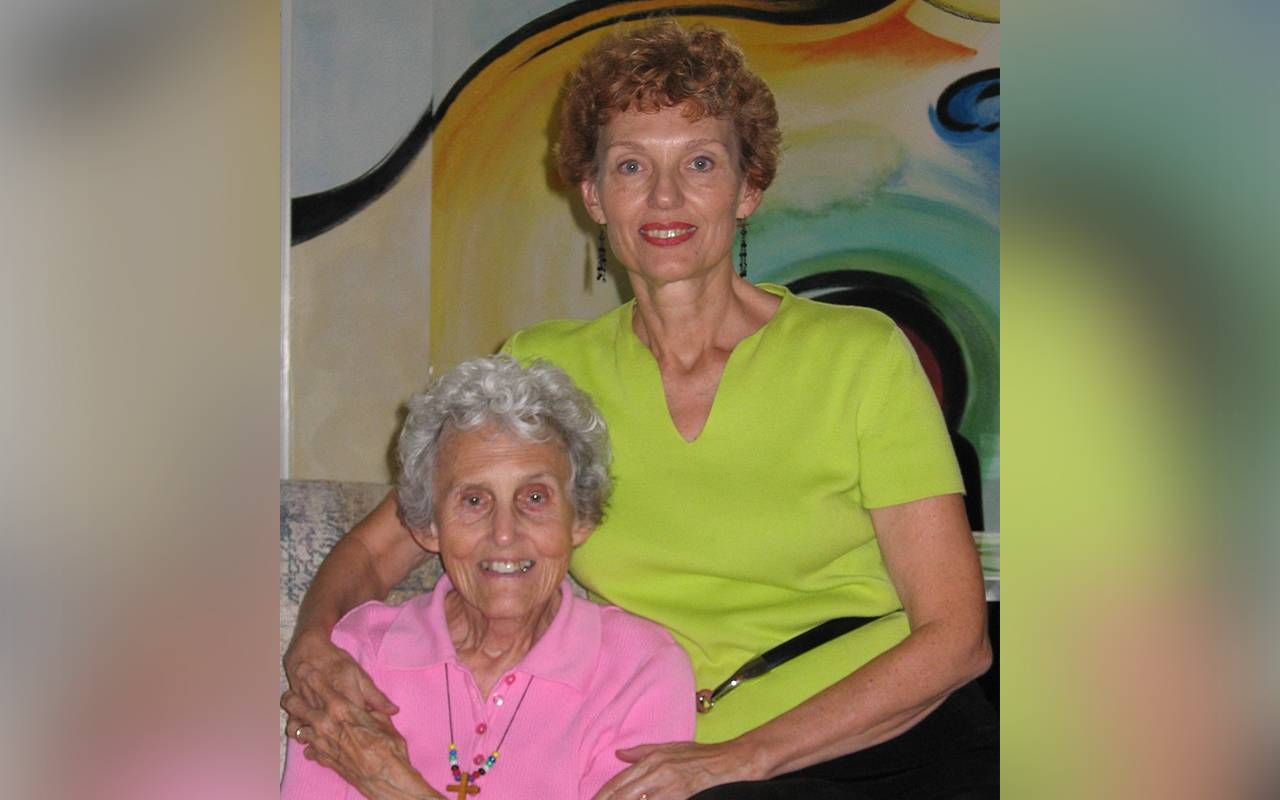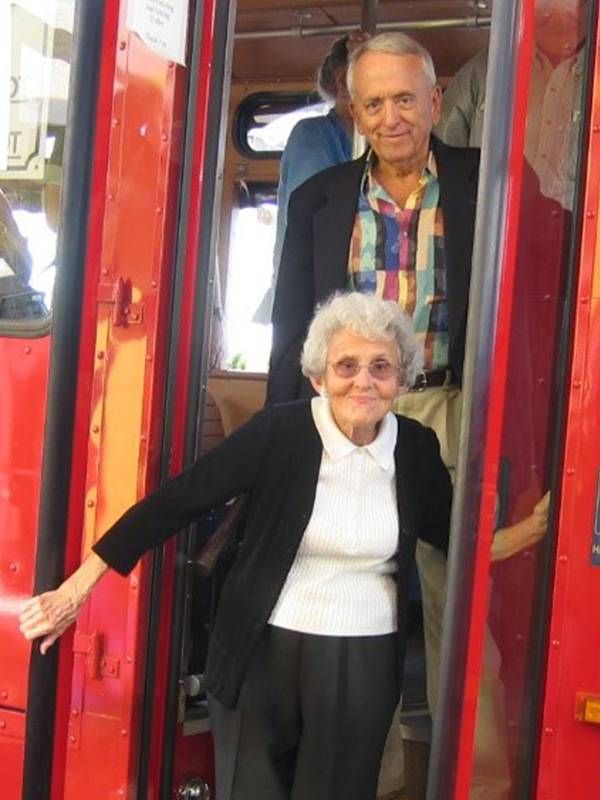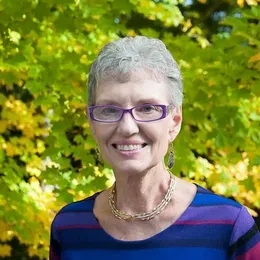I Helped My Mother To Live and Later Die
After begging her mother to live longer, this author later honors her mother's wishes for how she wanted to be treated at the end of her life
"Please don't die now, Mom! I can't handle two funerals back-to-back."
In a panic, I squeezed my mother's hand as I sat beside her bed. The hallway's stark white light streamed through her doorway. Announcements crackled over an intercom as an equipment cart clattered past her room. Mom's roommate moaned in her sleep before returning to rhythmic snoring.

Then, finally, a sweet-faced nurse's aide said I could stay beyond regular visiting hours. Staring intently before she spoke, Mom said, "Your father came to me in a dream last night and told me it was time to let go and be with him again."
Mom Loved Her New Life
Flashback to Dad's death from colon cancer, a few days after his 80th birthday. After he passed, Mom moved over 1,000 miles from her house on a dusty, isolated road to live near me and my husband, Tom, in Florida.
She blossomed like the red roses she cared for near her apartment.
Leaving sadness and grief behind, she chose a sunny independent living apartment in a continuing care retirement community (CCRC). There she blossomed like the red roses she cared for near her apartment.
Mom made new friends fast, joined afternoon card games, shelved books at the community library, tended a meditation garden, participated in church activities, baked yummy chocolate chip cookies to share, traveled to visit a few relatives across the country, and enjoyed an occasional happy hour glass of sangria with girlfriends.
In addition, Tom and I included Mom in many local activities. "I love my new life here," she often said. Mom's newfound happiness lasted almost two years.
Life Changed
A serious fall interrupted Mom's joyful journey. After spending Thanksgiving with Tom and me, my mother fell in her apartment, shattering her femur. Mom's next-door neighbor's frantic phone call brought the ambulance.
At the hospital, we authorized emergency orthopedic surgery. A few days later, she transferred to her CCRC's skilled nursing care wing, with weeks of physical therapy scheduled. Her spirit was crushed.
I was devastated, of course, but the knockdown punch to the gut hit in early December. That's when my husband visited his doctor, feeling unusually tired, with jaundiced skin and abdominal pain. He called me at work later, saying he'd been admitted to the hospital for specialized testing.
I bolted from my desk and didn't return to it for many weeks. Meetings and phone calls with medical staff filled our coming days. By week's end, we knew his diagnosis was a callous killer — late-stage inoperable, and untreatable liver cancer.
His prognosis was death within a few months. My 72-year-old husband chose home hospice care rather than a war he couldn't win.
Mom Rallied
"All right! I won't die now," Mom said from her nursing home bed when she understood Tom's death sentence. And that's just what she did.
Mom mustered her petite body's life force, willing her health to improve.
Mom mustered her petite body's life force, willing her health to improve.
She completed prescribed physical therapy, navigated with her fractured leg plus a walker, and moved back into her apartment with daily assistance from an aide and friends.
I boomeranged between caring for my mother and my husband. Then, Tom's progressive downward spiral gathered speed while Mom's condition stabilized. He died in my arms on February 12, 2007, with my brother beside us both.
A packed church celebrated my husband's life. Mom sat near me as I stood in the funeral's receiving line, both brokenhearted.
Years Before, We Talked About Care Preferences
"I don't want you kids to have to pull the plug on me someday," Mom said over a decade before.
Several years before Dad's death, our family discussed healthcare preferences if we experienced a severe illness. My mother had once carried the burden of being the one who authorized disconnecting her aunt and mother from life support after each suffered debilitating strokes.
"I didn't know what they would have wanted because we never talked about topics like that back then."
"I didn't know what they would have wanted, because we never talked about topics like that back then," she said. Mom felt she "killed Aunt Frances and your grandmother."
Dad, Mom, Tom, and I completed the Five Wishes advance care planning document years before we updated our estate plans. It's easy to understand, covering one's personal, spiritual, medical, and legal wishes at the end of life.
In addition, it identifies the person designated to make care decisions when you can't do it yourself. After my father passed, Mom revised her plans, naming me the primary health care agent.
The Beginning of Mom's Ending
After my mother told me about her dream of Dad, she didn't speak of that vision again until Tom died. Then her health plummeted within a month. Complications put her in the hospital again.

That's when she repeated that Dad was preparing to welcome her. She wanted to go. Tearfully hugging my mother, I told her it was OK. I understood. I wouldn't hold her back.
They requested my mother's advance health care documents when she was admitted to the hospital. I gave them a copy of her Five Wishes form, verifying she didn't want life support treatment to keep her body alive when she was close to death.
Even though this paperwork was accepted and filed, Mom's plans were almost upset when she went into immediate cardiac arrest in the middle of the night. Finally, exhausted, I left her hospital room to go home for a shower and a few hours of sleep. But a hospital nurse called after midnight, saying they were taking Mom to the intensive care unit (ICU) for life support.
"No! That's not what she wants! Read her advance care directives!" I yelled over the phone. "I'll be there as fast as I can. Please don't move Mom!"
I pulled on my jeans and raced for the car, driving in the dark over the speed limit. I ran to her room with a copy of Mom's Five Wishes form. Assistants started rolling her bed into the hall on the way to the elevator and the ICU.
Committed to Her Wishes
The nurse said she needed to get the doctor. He looked over the forms, stepped away for a few minutes, and returned to ask what I wanted. "Plain palliative care, please!" I answered.
I encourage you to avoid heartache and upset as you consider what you want and do not want for your end-of-life care.
Fast forward. That's precisely what happened, with my mother moving into a private hospice care room. My brother and I were allowed to camp with her in that room for the remaining three days of her life.
We facilitated a few short phone calls with her family, sang to her, read her favorite scriptures, and monitored her morphine. Then, before slipping into her final slumber, she told us of a clear new vision, where she saw relatives waving from across a bridge and preparing for a party.
"They have to wait for me to cross over that bridge before starting the festivities," she said. Tom and my Dad were in that welcoming crowd, along with her mother and aunt. She finally said, "Awesome!" as she crossed her bright bridge.
Most Don't Have End-of-Life Conversations
In June 2020, the National Poll on Healthy Aging was conducted for the University of Michigan's Institute for Healthcare Policy and Innovation. A sample of U.S. adults aged 50–80 was asked about their advanced care planning.
Nearly two in five adults aged 50–80 had not discussed their healthcare preferences if they experienced a severe illness. More than two in three hadn't completed an advance directive and durable power of attorney documents.
More than half of the folks who had not talked about their care preferences with others or completed related legal documents said it was because they needed to take the time to do this.
I encourage you to avoid heartache and upset as you consider what you want and do not want for your end-of-life care. I hope my story encourages conversations with you and your loved ones. It's a precious gift you can give them.


